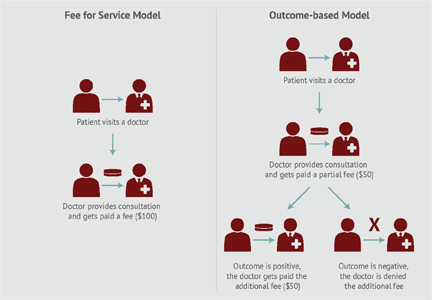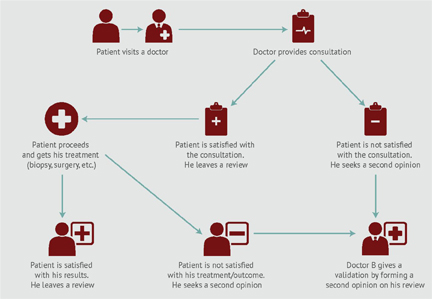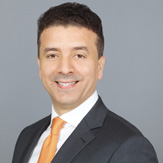Due to misaligned incentives, many healthcare recipients are receiving substandard care. The rising costs of running a hospital or care facility forces doctors to spend less time with individual patients, leading to misdiagnosis.
Costly tests and procedures tempt doctors to order unnecessary interventions for the sake of generating revenue. Without many methods of comparing doctor outcomes, healthcare providers can charge whatever they want without worrying about quality.
Second Opinion Review System
Implementing an incentivized peer review system into a healthcare platform, and publishing the outcomes, will help make the process of choosing a provider transparent and trustworthy. A model incentivized by earned tokens–a type of cryptocurrency–can lead to better outcomes overall.
Peers will receive compensation to review a peer’s diagnosis or recommended treatments. They either agree with the outcome (positive), or disagree (negative) without judging the health outcome of the patient. For instance, a patient correctly diagnosed with diabetes will earn a positive rating due to the correct diagnosis, rather than a negative rating due to the illness.
The Model
Doctors wishing to participate in the peer review system can opt in for free. They also have the choice of staking tokens for one month to increase the chance of reviewing a case. At the end of the period their tokens will be available for withdrawal, or they could re-up their membership in the review pool, possibly staking more or less tokens than last time.
When doctors check in to the review system they will see a list of cases they can sign up to review. They check the cases they want, or possibly hit one button to try for all the cases. After enough doctors have bid to review the case, Health Sapiens runs a lottery that awards the review to a specific doctor. Their chance of winning is directly tied to the size of their stake.
Doctors who are selected to complete the review get a notification, after which they have a small period of time in which to accept the case. Doctors who accept their notification will have a set period of time to complete the review. If they fail to complete it on time they will forfeit a portion of their stake.
Review Pool Example
The system has:
- 10 cases needing review
- 40 doctors who have joined the Review Pool:
- 3 doctors staked 1,000 tokens
- 8 doctors staked 800 tokens
- 13 doctors staked 500 tokens
- 16 doctors staked 100 tokens
This table shows the chances of winning the review opportunity based on each staking amount. Doctors will see this when they choose to take part in a review.
| # Tokens Staked | % Chance of Winning Review Opportunity |
| 1000 | 5.71% |
| 800 | 4.57% |
| 500 | 2.86% |
| 100 | 0.57% |
Each case needing review will need a fresh start with all the doctors, irrespective of whether or not they have already won a chance to review.

Over time, our ranking system will develop the reputation of high-quality physicians. Our physicians will receive their own ratings on the platform based on a global ranking system that is focused on objective and verifiable outcomes rather than subjective impressions.
This will set a new precedent in the Healthcare industry, similar to the FICO gold standard for good credit, so that good actors will be financially incentivized and adequately rewarded for good behavior.
Patients will be able to select physicians that have specific ratings. Physicians will be incentivized to earn the stamp of approval, as it will include them in the highest-paid pool of physicians.

Incentives
Patients seeking care will be incentivized to purchase and remain active members in the ecosystem for the following reasons:
- Tokens purchased maintain their utility indefinitely as opposed to an insurance policy that expires.
- Tokens purchased give direct access to care within a global verifiable system that provides price transparency across medical procedures.
- Physicians from the network have been peer reviewed and ranked based on their medical care outcome and performance.
Tokens purchased allow interoperability of electronic medical data and traceability of outcomes, giving patients the chance to access and transfer electronic medical record to any desired provider within our network.
Providers of care will be incentivized to participate and remain active in our ecosystem for the following reasons:
- Physicians can freely offer their services to a much broader audience worldwide.
- Physicians can earn additional income by reviewing their peers’ consultations and offering a second opinion.
- Intermediation is marginalized, and decentralization allows physicians to be in direct contact with patients from around the world.
- Ability to participate in seminars and continued education courses to keep abreast and informed on medical related topics.
Researchers will be incentivized to participate in the platform for the following reasons:
- Ability to access a network of patient EMR to further their research
- Ability to share their ground-breaking discoveries with the international community, bypassing central authorities and institutions that monopolize the vetting, issuance and distribution of scientific papers.
- Ability to earn additional income through seminars and courses related to their research.
The peer review system therefore uses a holistic mechanism to create incentives for all parties to play fair– rewarding patients, physicians and researchers for their contribution to the ecosystem. The better the outcome, the more success for the participating physician. Patients can then make better and more-informed choices for care.
To find out more about the future of HealthSapiens 2.0 (powered by blockchain technology) please visit healthsapiens.io and sign up for email alerts. Find us on social media: @healthsapiens
About The Author
 Karim Babay is Chairman & CEO of HealthSapiens, a nationwide healthcare provider that delivers on-demand access to healthcare anytime, anywhere, via mobile devices, the internet, video and phone. Mr. Babay is also the founder and Chief Investment Officer of Intrinsic Value Investment Partners, a value-focused hedge fund. Mr. Babay has over 15 years of global investing, entrepreneurial and corporate finance experience allocating capital across the capital structure (credit and equity), angel investing, liquid and illiquid investments in securities. Mr. Babay has published numerous studies and analysis while at Columbia University. Mr. Babay is member of the board of directors and Chairman of the compensation committee of GLYECO, a publicly traded company, principally involved in processing of waste into high quality ethylene glycol. Mr. Babay received a B.S. in finance and economics from HEC Institute and an MBA from Columbia Graduate School of Business.
Karim Babay is Chairman & CEO of HealthSapiens, a nationwide healthcare provider that delivers on-demand access to healthcare anytime, anywhere, via mobile devices, the internet, video and phone. Mr. Babay is also the founder and Chief Investment Officer of Intrinsic Value Investment Partners, a value-focused hedge fund. Mr. Babay has over 15 years of global investing, entrepreneurial and corporate finance experience allocating capital across the capital structure (credit and equity), angel investing, liquid and illiquid investments in securities. Mr. Babay has published numerous studies and analysis while at Columbia University. Mr. Babay is member of the board of directors and Chairman of the compensation committee of GLYECO, a publicly traded company, principally involved in processing of waste into high quality ethylene glycol. Mr. Babay received a B.S. in finance and economics from HEC Institute and an MBA from Columbia Graduate School of Business.

